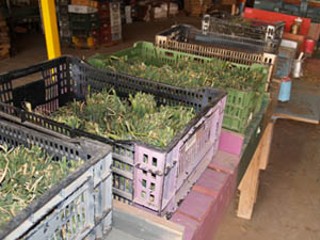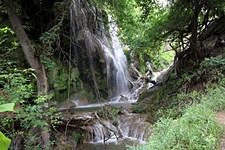Day Trips
The family-owned Dixondale Farms of Carrizo Springs is the largest and oldest producer of onion plants in the U.S.
By Gerald E. McLeod, Fri., Jan. 27, 2006

Dixondale Farms of Carrizo Springs has been making people around the country cry since 1913. The family-owned business is the largest and oldest producer of onion plants in the U.S.
If you haven't planted your onion transplants by the end of January, it is probably too late for this year. But if you're ready to stick something in the ground or you're planning for next year, the little onion factory in South Texas has the freshest starter plants and best advice.
"The general rule for when to plant onions," says Pam Martin, customer service manager of Dixondale Farms, "is to plant them six weeks before average last freeze for your area." Depending on who you ask, the last freeze of the year in Central Texas will happen sometime between March 3 and 28. You might get away with planting your Southern Bell Reds as late as Valentine's Day.
The majority of the millions of plants raised by Dixondale Farms are shipped to nurseries around the country. Backyard gardeners can order the same plants directly from the farm over the Internet or by phone. If you happen to be in the Carrizo Springs area, which is about 120 miles south of San Antonio, stop by the offices and pick up a bunch of 60 to 75 baby onions for only $1.50.
While you're in the area, ask for a guided tour of the 300-acre farm outside of town to see how the plants are raised and harvested. Onions, a member of the lily family, are grown from seeds, but because their growing season is quite long it is best to begin with transplants. This is particularly true the farther north you get. The staff is ready to recommend varieties that grow in particular regions of the country.
"The best time to visit us is between November and February," Martin says. Her husband, Bill, is a direct descendent of the farm's founder, Joseph McClendon. The business began in the early 1900s when Dimmit County was part of the Winter Garden Region of South Texas. It's hard to drive down one of the highways and imagine that the land now covered with prickly pear cactus and mesquite trees was once advertised in northern markets as a farmer's paradise.
The irrigation of crops with water from artesian wells began in 1884 with a well drilled outside of Carrizo Springs. Five years later a land rush began when T.C. Nye earned $1,000 dollars an acre with Bermuda onions grown in his fields outside of Cotulla. By 1899, the land developer who helped to establish the town of Del Mar, Calif., came to South Texas to develop more than 2,000 acres of farmland.
Land that was once used to graze sheep and cattle was cleared and irrigated with water from more than 200 wells drilled around Dimmit County alone. The boom peaked in 1909 when a 40,000-acre development south of Carrizo Springs opened to farm families attracted by low land prices and a growing season that lasted nearly year-round.
The region became one of the most prolific vegetable-growing areas in the country. Onions were soon joined in the fields by strawberries and spinach as well as orchards of fruit trees. The dream of turning the desert into a garden began to collapse as the underground water table dropped from the burden of more and more irrigation wells. By 1916, two extended droughts and depressed farm prices doomed the small farms to failure.
Dimmit County continued to supply the rest of the country with cantaloupes, lettuce, tomatoes, and other vegetables through the 1950s. By 1965, only a few thousand acres were being irrigated for crops. Most of the land had reverted to rangeland that now supports cattle and deer hunters. Since the 1970s, the county's major source of income has been from wells pumping oil rather than water.
Through it all, the Dixondale Farms has grown through five generations. Besides raising cattle, the family grows onions from fall through spring and cantaloupes during the summer. Gardeners can pick up the onion plants at 2007 N. First St. in Carrizo Springs or have the bunches delivered to their mail box by ordering from 877/367-1015 or from www.dixondalefarms.com.
763rd in a series. Day Trips, Vol. 2, a book of Day Trips 101-200, is available for $8.95, plus $3.05 for shipping, handling, and tax. Mail to: Day Trips, PO Box 33284, South Austin, TX 78704.








